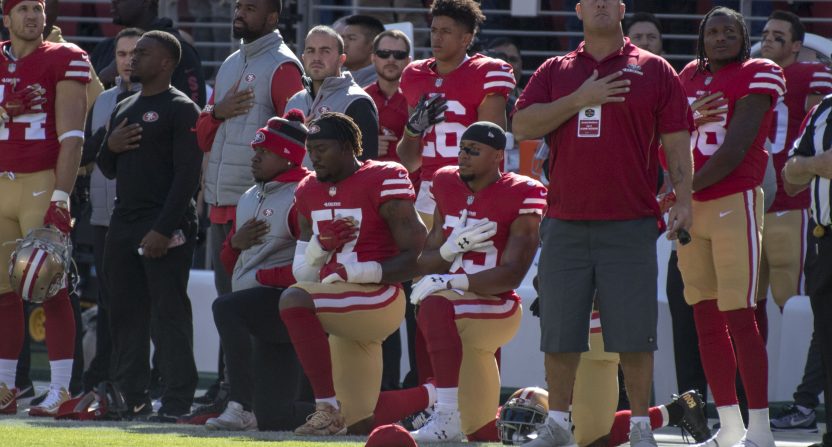The NFL’s new policy prohibiting player protests during the national anthem has spawned plenty of backlash, from the players’ association through plenty of journalists through even some owners, and has led to calls for boycotts from those unhappy with the new restrictions. (And even from some who think the new restrictions don’t go far enough, as they allow players to stay in the locker room.) But rather than debating the merits of this NFL move yet again, it’s interesting to ponder this in the larger context of how the league often seems to hurt itself, with their response to everything from domestic violence situations to concussions to sports betting to Deflategate often just making things worse. And this latest response certainly seems to be doing that:
Those issues are challenging regardless of how you address them, of course, and any response would carry some backlash. But it’s interesting to note that while, say, MLB and the NBA do take some occasional criticism for their handling of sensitive issues, it’s nowhere near as widespread or as fervent as the criticism the NFL gets. Some of that is thanks to inherent factors, such as concussions being more prominent in football, and some of it’s just thanks to the NFL being larger and even more in the spotlight, but there appears to be a significant portion of this that’s about the NFL’s own response.
And this tweet in response to the NFL’s statement summed it up pretty well:
That’s an overarching pattern we’ve seen from the NFL, even when it comes to things like the catch rule. At many times over the years, the NFL has tried to clarify what was and wasn’t a catch, but they’ve often done so by adding further complications. (They’re finally maybe headed in the right direction with a return to a simpler rule this offseason, but it still has plenty of potential problems.) And we’ve seen that with their inconsistent action on other subjects, from concussions (denying the links between football and CTE for over a decade, taking forever to implement an in-game concussion protocol, implementing that protocol inconsistently, delaying or denying payments to former players suffering from concussions while claiming fraud, etc) through domestic violence (inconsistencies within the Ray Rice case, inconsistencies from Rice to Josh Brown to Ezekiel Elliott, etc).
Their approach has generally been “Okay, we’ll write a new rule to deal with what happened last,” but that rule then further complicates things the next time an issue arises, and it leads to an overall history of ineffective and inconsistent actions.
Some of that may be about the NFL’s structure and about the people who have power in it. Commissioner Roger Goodell takes much of the blame for the league’s issues, and some of that is certainly fair (especially when it comes to him personally handing down discipline to individual players and teams without much of a policy framework, creating tons of complaints about inconsistencies), but it’s not all about him. The very public struggle with Dallas Cowboys’ owner Jerry Jones over Goodell’s new contract, which may have even led to things like then-Papa John’s CEO John Schnatter’s criticism of Goodell and the NFL, helped to illustrate much of the infighting that exists in the NFL.
That’s also clear with comments from owners like Bob McNair’s “We can’t have the inmates running the prison,” which kicked off whole new waves of protests. In fact, the whole record of the players-owners meeting last fall where McNair made those comments shows a widely divided group of owners and executives that can’t agree on any actual action. And that’s still the case today, with owners like Jed York and Christopher Johnson criticizing the moves here:
The NFL has seemingly centralized less power in the commissioner’s office than MLB (especially in the post-league president era) or the NBA for many matters, which makes it hard for Goodell and the league officers to do much on tricky subjects like this without approval from a wide range of owners. And that could be fine if the owners were on the same page, but in many cases, they’re not. So that leads to a lot of inaction and a lot of ineffective action. (And inaction can be problematic action in its own right, as discussions of Hamlet often note.) And in areas where Goodell is given wide power, such as player discipline, that often hasn’t worked out either, with too much focus on discretion leading to easy arguments that individual decisions are unfair.
But overall, the NFL appears to be a highly-fractured league, and a league that doesn’t respond to challenges with decisive action, often adding in more complications and more rules instead and making no one happy in the end. And that’s particularly important in this case; they’ve now annoyed a whole new swathe of people concerned with how they’re restricting players’ protests, and they haven’t appeased some of those who were mad about the protests. As with many things the NFL has done lately, they’ve only hurt themselves, and made very few happy in the process.
